The day my life changed - a rock fishing survivor's story
- Published Date
- 20/12/2022
- News Topic
- Beaches & Lifeguards
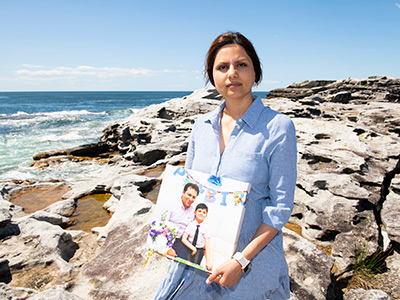
When 10-year-old Mahan and his 41-year-old father Payam were swept into the sea while rock fishing at Little Bay, they didn’t make a sound. They didn’t shout out, they didn’t scream. Hasti Masoumi had a choice to make. Jump in to try and save her son and husband . . . or call for help.
It was Monday 31 January 2022 – the last day of school holidays. It had been a wet summer, but for a change, the weather was good – mostly sunny and 28 degrees.
The Masoumi family from Kellyville were planning to spend the day together.
They’d been to Little Bay Beach twice before. Forty-one-year-old Payam, known as Peter to his friends and customers, had done some work around the seaside area and knew how beautiful it was.
For the Iranian-born couple, it must have been a stark contrast from their homeland. Payam and Hasti married in Iran but fled the country to start a new life as they were persecuted for their Bahá’í faith.
First they fled to Turkey, then three years later in 2010 they migrated to Australia and settled in the Kellyville area.
On their previous visit to Little Bay, they had seen people fishing on the rocks near the beach, so Payam decided to buy some fishing rods for him and his son to try their luck.
The day before their visit, they bought two rods – a kids rod for 10-year-old Mahan and a bigger rod for Payam along with some tackle.
Hasti recalls she was a little concerned about safety as none of them could swim.
She tried to buy some sort of flotation device – but could only find children’s swimming aids suitable for children learning to swim. She didn’t know rock fishing lifejackets existed.
As they’d never fished before, they watched Youtube videos the night before to learn how to set up their rods.
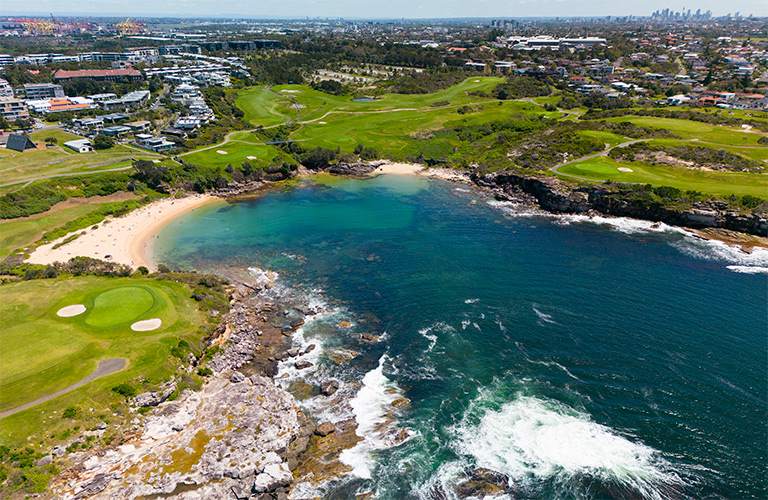
The next day, Payam’s phone was ringing like crazy. He was a Fox Mowing franchisee and after the wet summer, he had a lot of customers keen to get their lawns mowed.
Hasti encouraged him to work in the morning and make the most of the good weather so they decided to delay their trip to the beach until the afternoon. Hasti made sandwiches and packed their bags.
The trip from Kellyville took about 90 minutes and they arrived at 2.30pm. It was sunny with just a light wind and it had just changed to low tide.
The family walked down the timber staircase to the beach and along the sand to the rocks on the south side of Little Bay to a fishing spot known as The Gutter.
The rocky outcrop has three metal poles cemented in place over the past half century by rock fishermen as safety aids.
At low tide, the area looks like part of the coast, but at high tide it becomes an island marooned from the mainland by a shallow trough of water.
Hasti, Payam and Mahan walked out onto this rocky outcrop and began setting up their rods.
They had no safety gear, no fishing licence and were wearing thongs.
“It was a sunny day and the swell was fairly benign,” says Hasti. “It was calm and no waves and I wasn’t thinking it was dangerous. Before when I hear someone had drowned, I always thought they might have been swimming or been in a boat, I never thought that they might have been standing on the side of the ocean.”
While the sea appeared calm, swell data from the day shows a moderate 1.4 metre easterly swell.
Ocean swell and wave heights affect different rock platforms differently, depending on the direction they face and the nearby environment.
One area might be safe and another platform just metres away may be more risky. A low tide combining with a direct swell from the east, meant the area would have been tricky to fish, with the potential for the odd wave to stand up and cover the ledge.
Mahan and Payam set about getting their fishing rods ready, while Hasti looked for a place to put their bucket and bags. In the next few seconds, everything changed.
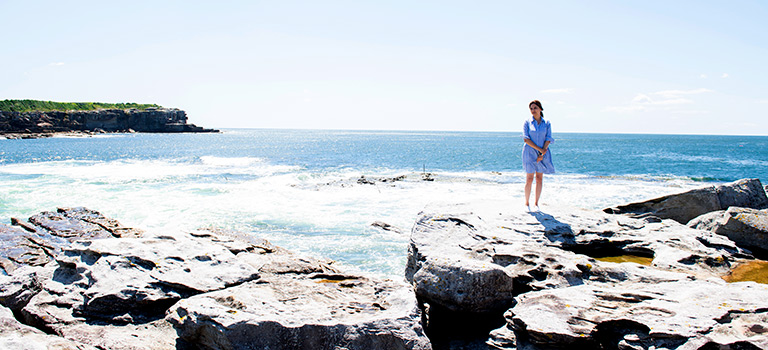
“In one second a huge waved splashed on me and everything I was carrying was thrown towards the rocks. I turned back (to where Mahan and Payam had been standing) and realised no one was there.
“At first I didn’t realise they were washed into the sea then I moved a little bit further to the edge of the rocks and saw both of them in the water. My husband was very far from the rocks and my son was much nearer to the edge of the rocks.
“I ran towards the edge and I was thinking I should jump in the water and save my son. But I don’t know why, when I arrived at the edge, I stopped and turned back and called for help. I didn’t jump, I don’t know why . . . but I wish I had.”
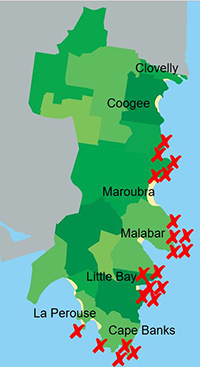
It was a decision that will stay with Hasti forever.
She couldn’t swim and had always been afraid of the water never even venturing to put her feet in.
As Hasti watched her son and husband struggling in the water, she screamed for help. Nearby fishermen called emergency services.
Within ten minutes Council Lifeguards arrived on site, with ambulance crew and Westpac Rescue Helicopter arriving soon after.
But it was too late.
Without being able to swim and without a lifejacket, neither Payam or Mahan could stay afloat.
They were taken out of the water – Mahan winched up by the Westpac chopper and Payam by Randwick Lifeguards on a jet ski.
CPR was performed, but they could not be revived.
“In that moment everything changed. I lost my husband, my son, my entire life and all of the identity I had before, in just a few minutes.
“This trauma will live with me forever, until the last moment I’m living,” says Hasti.
Since 2001 there have been 21 rock fishing related fatalities in Randwick City, making the area statistically the most dangerous place to rock fish in Australia. Six people have died at Little Bay alone – including four at the well-known black spot on the north of the bay, called Julieanne’s.
In 2016 compulsory life jacket laws were introduced in Randwick City and Council and Surf Life Saving NSW have held numerous safety workshops, giving out free lifejackets.
Randwick Council is installing a memorial for Mahan and Payam. It will be a place where their family can pay their respects and remember a loving husband and popular kid who went to North Kellyville Public School.
Fast forward almost a year and Hasti has only returned to Little Bay twice, including for this interview and photo for Randwick Council.
It’s not a place she likes to visit.
The sounds of the crashing waves, normally so calm and peaceful for many, take on a much different meaning for Hasti.
Now studying nursing, Hasti is soon to start two upcoming placements and she hopes to get fulltime employment at a hospital.
For Hasti life is continuing, but it will never be the same.
Improving safety for rock fishers
Since 2005 more than 100 people have died while rock fishing in NSW with 21 fatalities occurring in Randwick City. This makes our coastline the most dangerous area for rock fishing in Australia.
Randwick Council has been at the forefront of rock fishing safety with a number of initiatives:
- Installing ‘shock’ signs communicating the number of fatalities in a location
- Introducing laws in 2016 requiring compulsory wearing of lifejackets
- Conducting multilingual surveys of rock fishers
- Holding rock fishing safety and skills workshops
- Giving away free lifejackets
- Installing live cameras at beaches to help fishers assess conditions before leaving home
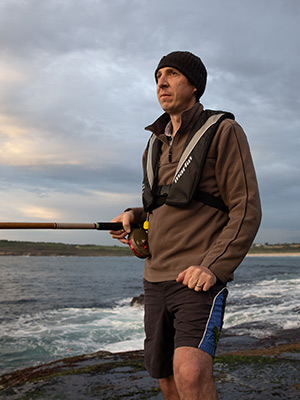
A fisherman’s view
Joshua Hay is a Randwick Council staff member, a Little Bay resident and a rock fisher. He has fished many times at the rock ledge where Mahan and Payam died. “I think part of the problem is there’s still this perception that fishing is this fun, Aussie, laid back past-time. And it can be when you’re fishing with kids off a jetty… but rock fishing is different. You wouldn’t go abseiling or scuba diving without training or the proper gear, and rock fishing is the same. We need to change the perception of rock fishing from a fun past-time to a highly skilled sport requiring training, proper gear and perhaps certification. Until this happens, I fear more will die.”
Rock fishing musts…
✔ You must be able to swim.
✔ Wear non-slip footwear, such as cleats.
✔ Wear a lifejacket.
✔ Fish with a friend.
✔ Check the conditions.
✔ Watch the water for 20 minutes before fishing.
✔ Develop your skills. You cannot learn to fish from social media alone. First timers should go out with an experienced rock fisher or a professional fishing guide.
This story was originally published in Randwick Council's summer 2022-23 Scene Magazine.
